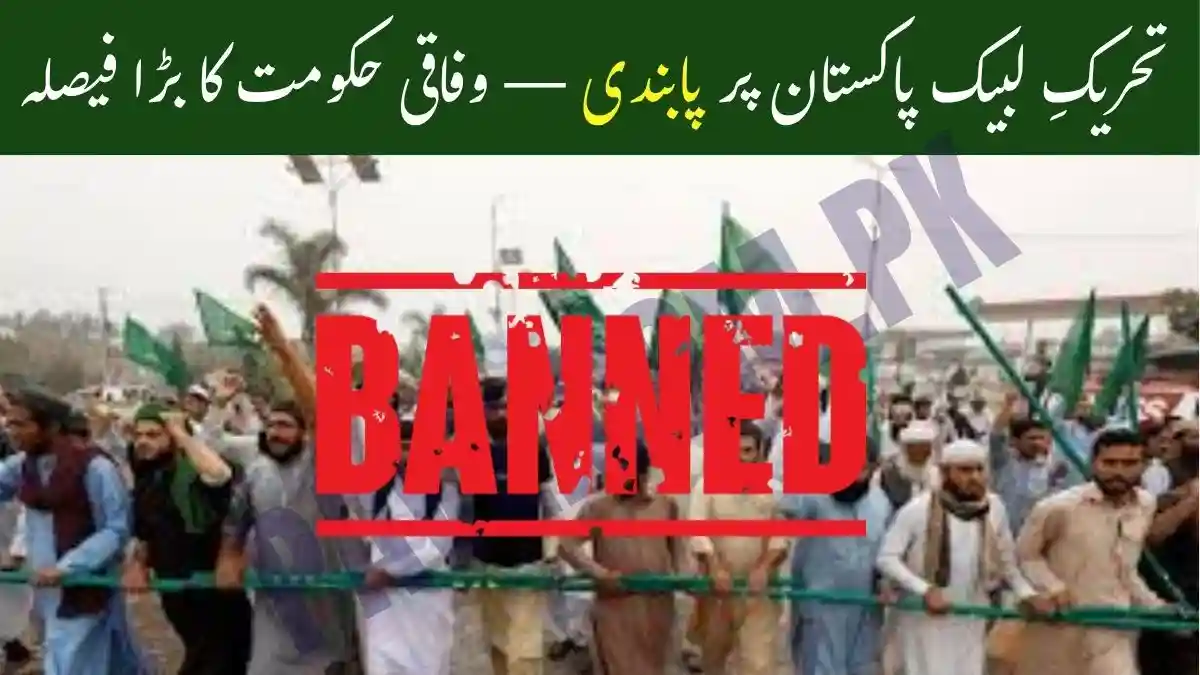Breaking News: TLP Banned in Pakistan — Interior Ministry Issues Official Notification
The Government of Pakistan has officially declared Tehreek-e-Labbaik Pakistan (TLP) a banned organization after the federal cabinet approved the Punjab government’s recommendation to impose restrictions under the Anti-Terrorism Act, 1997. This decisive step follows weeks of heightened tension, protests, and growing security concerns across several cities. The Interior Ministry confirmed the development through a formal notification, marking the latest and most serious measure taken against the party to maintain law and order in the country.
Government Formally Declares TLP Banned in Pakistan
According to the notification issued by the Ministry of Interior, TLP Banned in Pakistan officially means the group has now been added to the First Schedule of proscribed organizations under Pakistan’s anti-terrorism laws. This move effectively bars the organization from operating, fundraising, or holding public gatherings anywhere in the country.
The decision was taken after a detailed security review by intelligence agencies and provincial authorities. Officials concluded that the group’s repeated acts of public disorder, violent protests, and attacks on law enforcement had disrupted national stability and endangered public safety.
Details of the TLP Ban Pakistan 2025 Notification
Under the TLP ban Pakistan 2025 notification, all of the party’s offices, accounts, and activities have been frozen or suspended. The Interior Ministry has directed the State Bank of Pakistan to block all financial transactions linked to TLP, effectively freezing its bank accounts across the country. Law enforcement agencies have also been instructed to seal the group’s offices, remove its banners and flags, and stop any planned rallies or public gatherings.
Read Also: Gold Prices in Pakistan Drop Again — Per Tola Falls by Rs. 2,000 Amid Global Decline
The notification states that any individual or institution found assisting or supporting TLP’s activities will face strict legal consequences. The ban extends to all provincial administrations, which have been ordered to enforce the federal decision immediately.
Legal Framework and Procedure for Enforcement
According to government officials, the decision to declare TLP banned in Pakistan is based on clear evidence gathered under the Anti-Terrorism Act (ATA). The Interior Ministry’s detailed report will now be forwarded to the Ministry of Law and Justice, which will prepare a formal reference to be submitted to the Supreme Court of Pakistan.
This legal process ensures that the ban receives full constitutional validation, establishing TLP’s inclusion in the official list of proscribed organizations maintained by the federal government. Once the Supreme Court acknowledges the reference, the ban becomes irreversible unless overturned by future judicial or political review.
Reasons Behind the Decision
The move to ban TLP follows a series of violent protests and road blockades organized by the party in recent years. The group has often been accused of inciting unrest and confronting law enforcement during demonstrations that paralyzed major urban centers, particularly in Punjab and Sindh.
Sources within the Ministry of Interior revealed that the party’s leadership had failed to comply with repeated warnings and legal notices. Instead, the organization continued to mobilize supporters for street protests that frequently escalated into violent clashes.
Officials further clarified that the government had no political motive behind the decision but was compelled to act in the interest of national security. The Pakistan interior ministry TLP decision was finalized only after thorough consultation between federal and provincial stakeholders, ensuring that the move was both legally sound and strategically necessary.
Read Also: Punjab to Publish 3 Textbooks in Urdu from Next Academic Year
Tehreek-e-Labbaik Banned Notification — What It Means
The Tehreek-e-Labbaik banned notification formally prohibits all organizational, financial, and political activities under the TLP name. The group will no longer be able to contest elections, register with the Election Commission of Pakistan, or hold public processions.
The notification also authorizes the freezing of TLP bank accounts in Pakistan, suspension of its social media channels, and a review of all registered assets linked to the organization. The government aims to ensure that the party cannot rebrand or reorganize under a different title to bypass the restrictions.
According to interior ministry officials, the ban does not extend to individual members unless they engage in proscribed activities. However, any continued public demonstrations or fundraising efforts on behalf of the party will be treated as criminal offenses under national security laws.
Background — From Political Force to Proscribed Group
TLP first rose to prominence in Pakistan’s political landscape as a religious movement focused on issues of blasphemy and faith-based politics. The party gained rapid popularity due to its populist approach and ability to mobilize large numbers of supporters across Punjab. However, over the years, its protests increasingly turned confrontational, often leading to property damage, injuries, and disruptions to public life.
After repeated warnings and multiple agreements between the party and government representatives, tensions resurfaced earlier this year when demonstrations once again turned violent. Following these developments, the Punjab government submitted a detailed summary to the federal cabinet, recommending a ban on the organization. The cabinet unanimously approved the proposal, setting the stage for the TLP ban Pakistan 2025.
Official Reactions and Statements
Minister of State Ali Muhammad Khan stated that the government had fulfilled its commitments under previous agreements with TLP and had shown patience despite repeated provocations. “The state respects all religious organizations, but no group can be allowed to disrupt peace or challenge the writ of the government,” he said.
Punjab government spokesperson Uzma Bukhari reiterated that the move was not against religion or religious expression but against disorder and violence. “TLP was not doing politics; it was spreading chaos,” she remarked, emphasizing that the government will always protect peaceful expression but will act decisively against extremism.
Political analysts have described this step as a defining moment in Pakistan’s internal security framework. By banning TLP, the government has signaled a zero-tolerance approach toward any organization involved in inciting violence or destabilizing law enforcement efforts.
Read Also: Punjab Driving License Update 2025: Chooses New Company for License Card Manufacturing
Enforcement Measures Underway
In the aftermath of the TLP banned in Pakistan decision, law enforcement agencies have begun implementing the restrictions. Major TLP offices in Lahore, Karachi, and Rawalpindi have been sealed, while intelligence teams are tracking financial and operational networks linked to the organization.
The TLP bank accounts freeze Pakistan directive has already been enforced through the State Bank, and further scrutiny is underway to identify indirect financial channels associated with the group. Security forces have also been placed on high alert in key urban centers to prevent potential demonstrations or backlash from supporters.
Broader Implications for Pakistan’s Political Landscape
The extremist party TLP proscribed Pakistan announcement marks a turning point in how the government handles politically active religious organizations. While Pakistan has a history of banning militant outfits, TLP’s inclusion in this list reflects a broader shift — where groups that engage in violent political activism will face direct state action.
Observers believe this step may strengthen the government’s credibility in maintaining public order while reinforcing its commitment to countering extremism. However, some experts warn that the ban must be coupled with community engagement, dialogue, and preventive measures to avoid further polarization.
Conclusion
The TLP Banned in Pakistan decision stands as one of the most significant security actions of 2025. With the Tehreek-e-Labbaik banned notification now in effect, the government has sent a clear message: no political or religious entity will be allowed to undermine peace and stability.
While the move may reshape Pakistan’s religious-political landscape, it also reflects a growing consensus that safeguarding national harmony and protecting citizens must take precedence over all else. The coming weeks will determine how the ban is implemented and whether it leads to lasting calm — or ushers in a new phase of political and social realignment.







